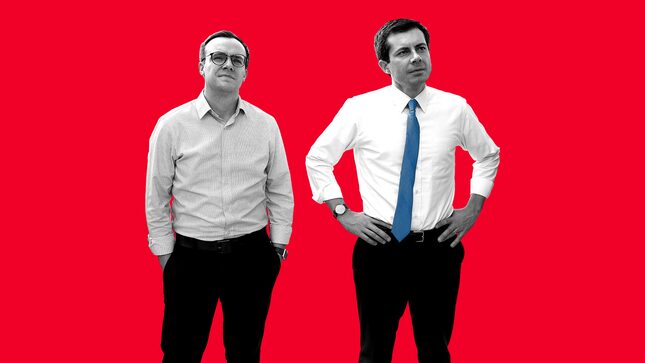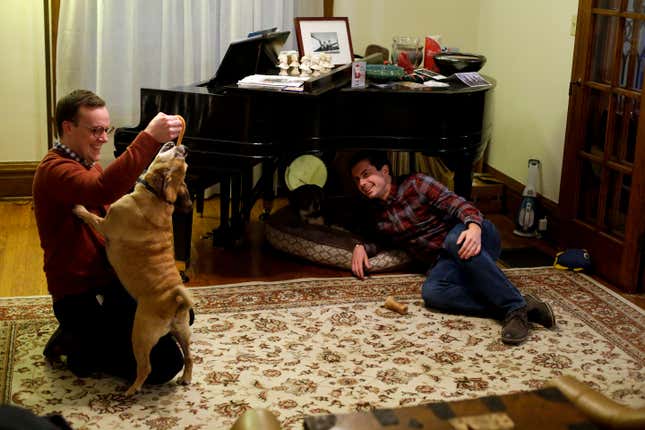What Pete and Chasten Showed Us
Latest
Graphic: Jim Cooke
“Their marriage is at once banal and extraordinary,” is how TIME’s Charlotte Alter described the union of Pete and Chasten Buttigieg in a profile last year. The photo on that issue’s cover—two white men in brown-belted business casual—said as much without words. Chasten smirked while Pete looked on with a presidential seriousness: he was, after all, the first openly gay man to be a serious contender for the commander in chief of his country. Were it not for the placement of their arms on each other’s backs, they could have been two bros who launched a start-up together. “First Family” read the cover line that ran across their buttoned-up chests. In a lyrical essay for the Los Angeles Review of Books, Greta LaFleur wrote that the picture presented “a vision of heterosexuality without straight people.” Banal and extraordinary, indeed.
Buttigieg’s presentation of his sexuality throughout his campaign, which he suspended Sunday night, thrived in the gray area between those poles, though his cultural worth was often painted in broad strokes. As a viable gay candidate for the president of the United States, he has been held up as a symbol of progress. He has proved how far a queer person can go in our society and has theoretically opened doors. “If you are a gay kid in suburban Ohio, you are inspired by Pete’s campaign,” Democratic speechwriter Alex Halpern Levy recently told The Guardian. Last week at a rally in Denver, a 9-year-old boy named Zachary Ro asked Pete to help him come out. “I want to be brave like you,” the kid told Pete.
Pete’s importance wasn’t lost on his first gentleman in waiting, either. “It’s just so important to go out there and do a good job right now,” Chasten said in a 2019 Washington Post profile. “Because for the first time in many people’s lives, they see someone on a national scale that makes them say, ‘Oh, that’s me, too.’ ”
“I have seen Peter go out there and change people’s lives, save people’s lives because of the visibility of his campaign,” said Chasten in a more recent interview with ABC News.
Navigating between the banal and extraordinary required what seemed like a prodigious amount of calculation, and calculating is Buttigieg’s forte. As a man who didn’t come out as gay until he was 33, years after being elected into public office as the mayor of South Bend, Indiana, he is used to juggling multiple consciousnesses. “Before going overseas, I had felt comfortable being more than one person, as we all sometimes must, according to the roles we are called to play,” he writes in his 2019 memoir Shortest Way Home: One Mayor’s Challenge and a Model for America’s Future.
It’s an idealized place I’ve never visited, but that I suppose could exist.
Buttigieg’s life and humanity, which necessarily includes that of Chasten, appears to have been painstakingly packaged for public consumption. To examine the platonic ideal of the Pete-Chasten union as it has been presented (at least through these eyes of a nonmonogamous gay guy in Brooklyn, with little interest in a formal institution to legitimize my love and absolutely zero interest in ever having children—unless you count cats, which I kind of do), feels like gazing at one of those ceramic Dickens villages people put up at Christmastime. It’s an idealized place I’ve never visited, but that I suppose could exist. It is less my concern to refute the story that Pete and Chasten have told about their relationship than to examine their narrative as a failsafe model for acceptance in mass culture, particularly when the aspired position in said culture almost certainly involves scrutiny on one’s personal life.
Buttigieg’s campaign didn’t just show the world what a gay man can achieve, but how such achievements might be accomplished. It seems that there are no coincidences here, especially when other aspects of his identity (his whiteness, his affluence, his broader privilege) are factored in. Utter perfection and absolute normalcy are such impossible ideals that their combined projection creates its own uncanny valley: queerness that does not deviate from the mainstream but reinforces it.
There is no question as to whether Pete Buttigieg is an assimilationist—he is, which is why whenever he describes himself as queer (or, as he is more wont to do, mentions “queer people” including himself), it’s startling. Buttigieg is a moderate in both the political and personal realm. In Shortest Way Home, he repeatedly describes his relationship with Chasten as “normal.” “Today, being in a committed relationship with Chasten just might be the most normal thing about my life,” he writes. And then: “Trying to visualize it from the outside, it strikes me that my partnered, gay ‘lifestyle’ is a lot more normal, sustainable, and fulfilling than my prior lifestyle consisting almost entirely of work and travel.” In the book and elsewhere, he discusses conducting himself with Chasten “like any other couple.”
-

-

-

-

-

-

-

-

-

-

-

-

-

-

-

-

-

-

-

-

-

-

-

-

-

-

-

-

-

-

-

-

-

-

-

-

-

-

-

-









































